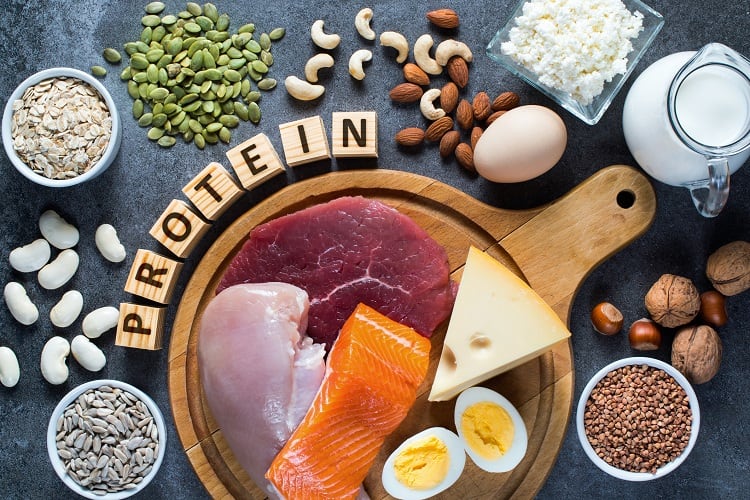Enter any supermarket across Europe and you’ll find multiple items boasting their high-protein credentials. From high-protein chocolate bars to high-protein yoghurts, the high-protein trend is proving powerful. But, while the benefits of a diet high in protein are well publicised, the potential harms are only just coming to light.
FoodNavigator recently reported on the potential damage a high-protein diet could cause to the heart. Then came the news that protein bars and powders could be damaging to gut health. Now, a new study is looking at the potential link between a high-protein diet and damage to brain health.
Is a high-protein diet damaging to brain health?
Research, from the University of Geneva (UNIGE), suggests that a high-protein diet could cause neurological disorders. The study, published in the Journal of Biological Chemistry, found that high levels of protein significantly boosts ammonium production in the body. These elevated levels can in turn overload the liver and could result in neurological disorders.
Why are high-protein diets promoted?
High-protein diets have been linked to whole host of benefits, including boosting energy and aiding weight loss. And it’s for these reasons that it is proving so popular with consumers worldwide.
In particular, patients with type 2 diabetes are often advised to adopt a high-protein diet to help to balance their sugar levels. But, the researchers wanted to understand the impact of such diets, on the rest of the body.
‘‘Diets rich in animal and/or plant proteins, known as Paleolithic diets, can be used to stabilise type 2 diabetes and regulate weight,’’ says Pierre Maechler, Professor at the Department of Cell Physiology and Metabolism at the University of Geneva Faculty of Medicine, who led the research on the potential damage a high-protein diet could cause to brain health. ‘‘But what impact do they have on the body? Are they harmless? That’s what we set out to find out.’’

How was the study conducted?
Ammonium is a waste product, produced when the enzyme, glutamate dehydrogenase (GDH), breaks down protein. However, when a diet high in protein is consumed, glutamate dehydrogenase is placed under pressure. To study the impact of this overload, Professor Maechler and his team fed healthy mice, and mice lacking the GDH enzyme in their liver, a high-protein diet.
The research team observed that, in healthy mice, although excess protein increased ammonium production, the liver managed this excess due to the action of the GDH enzyme, which detoxifies ammonium before it can cause damage.
However, by contrast, mice lacking the glutamate dehydrogenase enzyme, found that the liver was unable to eliminate the excess of toxic ammonium derived from proteins. And the results were observed almost instantly.
“No need to wait for weeks or months; a change of diet lasting a few days is enough to observe major consequences,’’ said Karolina Luczkowska, a former PhD student at the Department of Cell Physiology and Metabolism at the University of Geneva Faculty of Medicine, and the study’s first author.
These results suggest that, in the case of dysfunctional glutamate dehydrogenase enzymes, high-protein diets could cause a harmful excess of ammonium. This ammonium, not eliminated by the liver, could cause further damage to the body, in particular, neurological damage.
The researchers advise that people planning to embark upon a high-protein diet undertake a blood test to assess glutamate dehydrogenase activity in their liver. This would help to prevent the risk of overloading the metabolism with proteins, particularly for individuals whose glutamate dehydrogenase enzyme is deficient. ‘‘It is therefore important to be well informed before following a high-protein diet,’’ concludes Pierre Maechler.
Potential flaws in the study
It’s important to note that, like many scientific research studies, this study was conducted on mice not humans. But why are so many scientific studies conducted on mice?
“Mice experience many of the same diseases as humans and have the same types of organs and bodily systems, which makes them excellent models for human disease. Around 95% of the genes that code for proteins are identical in humans and mice. Researchers can compare mice with humans to look for similarities or differences (for example in symptoms or DNA changes) that may be clinically and medically significant,” said a spokesperson for the European Animal Research Association.
The study report, published in the Journal of Biological Chemistry, also failed to detail exactly what types of proteins were consumed. Were they plant-based, animal-based, or both? This may or may not have a bearing on the impact of the results.

Source: Dietary protein load affects the energy and nitrogen balance requiring liver glutamate dehydrogenase to maintain physical activity
Published online: 13 June 2024
DOI: https://doi.org/10.1016/j.jbc.2024.107473
Authors: Karolina Luczkowska, Yan Zhou, Angela M. Ramos-Lobo, Thierry Brun, Pierre Maechler





